Shocked into silence - Some children stop talking, stop playing, after severe trauma
Traumatised by the murder of close relatives or friends, and scarred from excessive abuse, some of the nation's children have gone mute.
Unfortunately, with only five speech pathologists in the island, there are not many persons qualified to get them talking again. Of those certified in the area, about four are in private practice.
Elective mutes are among the children being referred to the Mico CARE Centre for help. Vice-president for child development, diagnostic and therapeutic services at the facility, Angelita Arnold, says the centre's clinicians are being kept very busy because of the emotional turmoil the country's children have to endure on a regular basis.
"We did a survey in a particular community, because we found that we were getting a lot of referrals and we were seeing common behavioural patterns. I think there were about 300 children that we assessed and 90 per cent of them either witnessed somebody who was shot or killed, or had a relative who was killed. It was just death, death, death, and these were grade-five children. They were young children," said Arnold.
"It is easy for these children to decide early not to talk (and) they don't want to play," added Arnold.
President of The Mico University College, Dr Ashburn Pinnock, said it can sometimes take months or even years to rehabilitate these children.
"Some of them are walking dead; so we have to now breathe back some life into them through intervention," Pinnock told The Sunday Gleaner.
The Mico CARE Centre is considered the leading institution for the assessment and diagnosis of children with special needs in the country.
Administrators receive requests for help from at least 2,000 desperate parents each year, although the facility can only accommodate about 144 students from across the island at any given time.
"A lot of our children, it is emotional what they are going through. The physical, I wouldn't want to say it is less than it used to be, but it is less pronounced," said Arnold.
"Most of the problems that they have, they do not necessarily know how to express themselves, and if one doesn't have this child registered in an environment like ours, where we can do in-depth evaluation, the child's real problem is left unattended and could only become worse down the road," added Arnold.
She said while Mico is often criticised for not providing a space for many more children given the demand, it is necessary to keep the enrolment low so that students can get specialised attention. The facility has 38 persons on staff.
"The quality is also important. It is a like a doctor seeing 100 patients and not seeing them properly, so it is better to see 25 thoroughly," added Pinnock.
Mico tries to meet the demand by dispatching teams of special educators and clinicians to schools across the island to conduct assessments and provide limited intervention.
One secondary school in Clarendon referred 350 students at the beginning of this school year.
Arnold finds that the need for help is greatest in St Catherine, Clarendon and St Elizabeth, and she is hoping that special education institutions will be established in these areas.
The Mico CARE Centre has offices in Kingston, St Ann, Portland, and Manchester.


